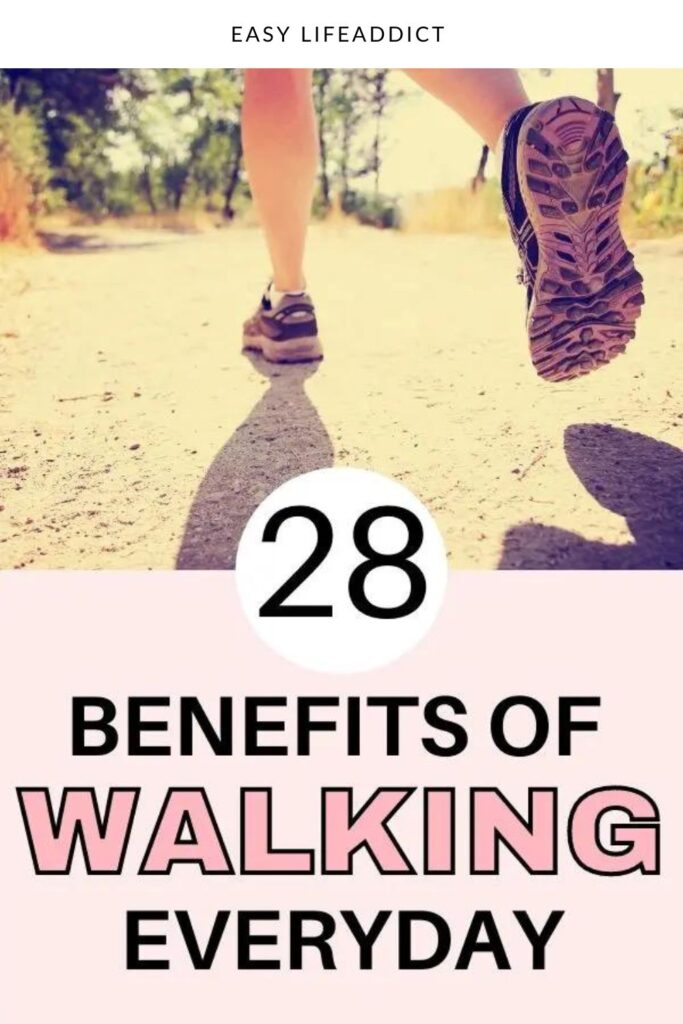28 Proven Benefits of Walking Every Day!
Walking is an incredibly easy and rewarding way to improve your overall health. Take just a few minutes every day for a stroll, and you’ll reap countless benefits! From enhanced physical fitness to improved mental well-being, these 28 benefits of walking every day will have you lacing up those shoes in no time. So take that first step towards success now; get walking today!
This post may contain affiliate links. That means that if you click on a link and purchase something I recommend, I will receive a small commission at no extra cost to you. As an Amazon Associate, I earn from qualifying purchases. This helps keep my website up and running and is very appreciated. Thank you for your support! You can read my full disclosure policy here.
Walking is one of the best forms of exercise. It’s free and simple, and almost anyone can do it. There are also huge health benefits to walking every day. You don’t necessarily have to walk for hours either; just 30 minutes a day is enough to reap the rewards. These 30 minutes also count towards the NHS’s recommended 150 minutes of exercise we all should be doing each week!
I love walking! I find there’s no better way of releasing tension and stress after a stressful day. I especially love getting out in nature. I’m lucky to live within walking distance of a local nature reserve, which gives me easy access to some lovely woodland and parks. It doesn’t matter how often I go. There’s always something different to look at, whether it’s the changing colours of the leaves or keeping an eye out for the local wildlife. It helps me to reflect, refocus, and feel more positive about life!
Even if you don’t have access to a local nature reserve, walking around town or your local park can offer many of the same benefits.
Before You Start Walking
Always make sure you’re prepared for a walk. You at least need to wear comfortable clothes and footwear and carry some water. If you’re going out for longer walks, always make sure you have some extra layers and a rain jacket in cooler weather, sunscreen and a sunhat in warmer weather, as well as some healthy snacks.
If you’re new to walking, why not download the Active 10 app? This free app tracks your walk and lets you know if you are walking too fast or too slow, depending on your goals. The app also enables you to set achievable targets and track your progress with rewards.
Download Active 10 from App Store.
Download Active 10 from Google play.
Staying Motivated to Keep Walking
The easiest way to get walking more is to make it a habit, incorporating walking into your everyday life.
There are numerous ways of doing this, such as ditching the car for shorter journeys, using the stairs instead of the lift or going for a walk after dinner with friends or family. Once you get into a routine, you’ll be walking more without realising it!
You could also listen to a positive podcast, audiobook, or music. By doing this, you will not only take your mind off the effort of walking but also anything that’s been bothering you throughout the day.
Other ways to keep yourself motivated to get out walking include joining a walking group and mixing up your walks. You don’t have to venture far to find a suitable walk; most towns and cities have beautiful parks, gardens, canals, woodlands, heaths, and nature reserves, offering fabulous options.

28 Benefits of Walking Every Day:
1. Helps reduce weight – You don’t have to embark on a major fitness regime to lose weight. By just doing 30 minutes of walking a day, you can burn between 100 and 300 calories. This may not be enough to lose a huge amount of weight, but it can certainly jump-start your weight loss at the start of your journey, especially if you’re not used to doing any exercise.
2. Improves heart health – Your heart is extremely important to your overall health. By walking every day, you strengthen your heart, reducing the risk of heart disease by 40%.
3. Reduces the risk of chronic diseases – Many chronic conditions result from sedentary lifestyles. One of the main benefits of walking daily is that you become more active, thus helping reduce the risk of chronic conditions.
4. Helps prevent some cancers – Research shows that regular physical exercise, such as walking, can reduce the risk of some cancers by as much as 30%. Walking also helps food digest better, lowering the risk of stomach and GI tract cancers.
5. Delays ageing – Walking daily can’t necessarily turn back time and make you look younger, but it can delay the ageing process. Daily walking stimulates blood to flow towards the skin, giving you a more healthy glow. It also helps firm the skin, reducing the appearance of saggy skin.
6. Lowers blood pressure – The risk of developing high blood pressure can increase as we age. However, taking a brisk walk daily can help keep blood pressure under control, thus reducing the risk of developing cardiovascular conditions.
7. Reduces the risk of stroke – People who walk at least 3 hours a week can significantly reduce the risk of stroke. Doing 35 minutes of activity a day, such as walking, has also been shown to reduce the severity of strokes by 50%.

8. Lowers risk of developing diabetes – Walking not only keeps obesity at bay but also reduces the risk of developing Type 2 Diabetes. It can also increase the amount of glucose used by our muscles and help the body utilise insulin more efficiently, keeping sugar levels within normal ranges.
9. Increases lung capacity – Your lungs bring oxygen into the body and remove carbon dioxide. Walking daily strengthens the lungs, increasing their capacity and helping them become more efficient.
10. Improves mood – Just like other forms of exercise, walking produces stress-busting endorphins and feel-good chemicals in the brain.
11. Helps curb sugar cravings – Studies show that walking for just 15 minutes reduces cravings for sugary and high-calorie snacks. It’s thought that in the same way, exercise can increase mood and reduce stress, it can also interrupt our thoughts about food and emotional food cravings.

12. Improves varicose veins – Walking is one of the best exercises for those with varicose veins. It is a low-impact exercise that works the calf and leg muscles without putting pressure on the veins, helping pump blood back up towards the heart. Walking not only stops varicose veins from getting worse, but it can also prevent them from developing in the first place.
13. Boost your immune system – Walking just 30 minutes a day is enough to boost your immune system. Walking, like other forms of exercise, can increase the number of white blood cells in the blood. These white blood cells are the first line of attack for fighting viruses and other immune-related illnesses. Research has shown that those who walk daily have 45% fewer sick days than those who don’t.
14. Speeds up digestion – Just taking a 15-minute walk after a meal is enough to aid digestion and improve blood sugar levels. For most people, a heavy meal often leads to feeling tired and lethargic. However, taking a short stroll afterwards can help food move faster through the digestive system, stopping energy slumps and giving you more energy!
15. Reduces the risk of dementia – Regular walking provides the brain and the rest of the body with the oxygen required to keep it functioning properly. Without regular exercise, you can develop brain fog, leading to reduced brain function. As the brain starts to shrink, your risk of developing dementia increases.
16. Inspires creativity – Walking can increase creativity on average by 60% compared to sitting still. It’s no wonder people like Facebook’s Mark Zuckerberg and Steve Jobs, Apple’s late co-founder, choose to hold meetings on foot instead of sitting around a table!
17. Reduces stress levels – The mood-boosting endorphins produced when we take a brisk walk make us feel happier, but they also reduce stress levels in the body, helping us feel more calm and relaxed.
18. Improve the quality of sleep – Walking more during the day can help you have a better quality of sleep. Studies suggest that those who engage in at least 10,000 steps a day have better sleep quality than those who don’t.

19. Strengthens your bones – Osteoblasts are the cells that build new bones. When stress is put on bones, such as when we exercise, osteoblasts respond by building more bone cells, making our bones stronger.
20. Provides the body with vitamin D – Vitamin D helps regulate the amount of calcium and phosphate in the body, and deficiency can lead to loss of bone density, which can cause osteoporosis and fractures. Research also suggests that vitamin D can improve the immune system and help reduce periods of low mood and depression. Vitamin D is not usually found in food like other vitamins and minerals; instead, our bodies produce vitamin D after exposure to sunlight. By getting outside and walking, we aren’t just getting a great form of exercise. We are also providing our bodies with essential nutrients.
21. Controls Cholesterol levels – Besides dietary changes, exercise is one of the best ways to help reduce the amount of low-density lipoprotein (bad cholesterol) in the blood, thus reducing the risk of cardiovascular conditions. Exercise also helps produce high-density lipoprotein (good cholesterol), protecting the veins from cholesterol buildup.
22. Enhances brain function – Daily walking is great for blowing out the cobwebs, so to speak, and lifting mental attitude. Research has also shown that exercise can boost the size of the hippocampus, the part of the brain responsible for memory and learning.
23. Tones the body – Like other forms of exercise, walking helps tone the body. Regular walking helps tone and strengthen your legs, making you look and feel better.
24. Improve skin tone – When you exercise, tiny blood vessels in the skin open up, delivering nutrients that can help repair skin damaged by the sun and environmental pollutants. These nutrients also help improve collagen production, helping reduce the appearance of fine lines and wrinkles.

25. Improve self-confidence – There are strong links between positive self-esteem and mental and physical health. Regular exercise can help reduce symptoms of some mental health conditions and improve physical health and fitness levels. This, alongside the benefits of well-being, such as the production of mood-enhancing chemicals in the brain, can help us feel better about ourselves.
26. Improves balance and coordination – Walking can improve balance and physical dexterity, especially in older people. We need to keep our muscles and limbs active to maintain movement and coordination. The more inactive we become, the less dexterity we have, leading to recurrent falls, injury and frailty.
27. Reduces fatigue – Walking increases blood flow around the body, thus providing cells and organs with all the necessary nutrients. If you are tired, taking a short walk will wake up your brain and body, giving you more energy and reducing fatigue.
28. Improve lifespan – Studies show that walking every day can extend your life and make it better. Research shows that those who exercise regularly live longer than those who don’t.
Final Thoughts
Walking is an excellent form of exercise that benefits overall health. It’s good for your physical and mental health, as well as your overall well-being and spiritual self. It’s free and requires no special equipment or training; it’s safe and low impact, reducing the risk of injury, and can be done anywhere. It’s the perfect route for those wanting to get fitter and improve their health. So what have you got to lose? Get your walking shoes on!
Remember to check out our related resources for more tips and guidance on leading a healthier lifestyle. Take control of your life and embrace a brighter future!
Thanks so much for stopping by; I appreciate everyone who takes the time to read and make it to the end! I have lots of exciting new content in the next few weeks, so make sure you pop back to catch up!









